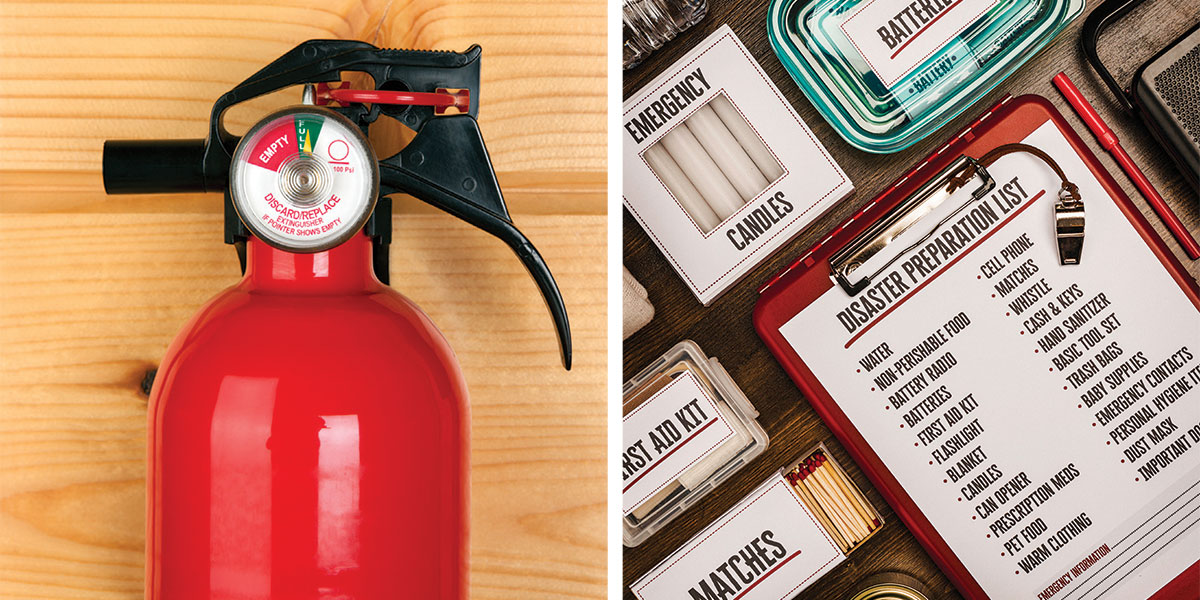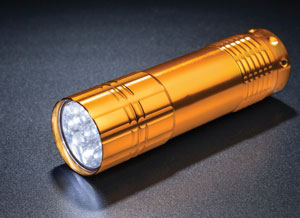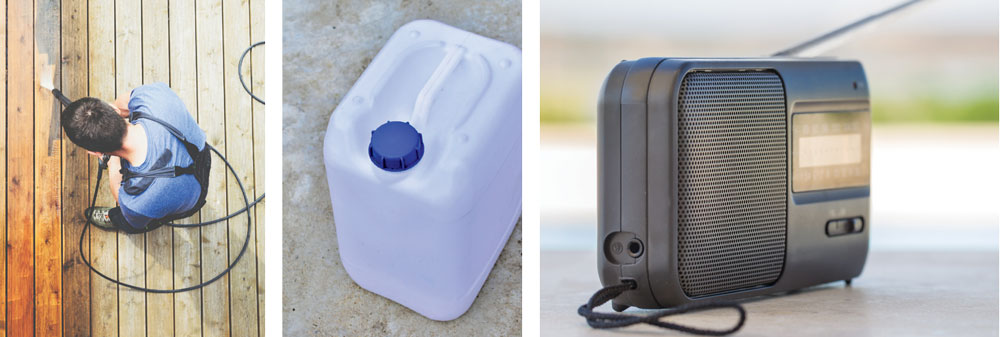
Everyone hopes they’ll never be victims of a natural disaster or other emergency that affects our homes and families, but unfortunately this is never a “never” proposition. So it just makes sense to think about emergency management in advance, and to prudently plan and prepare. Simply watching the news makes it clear what types of things can befall folks unexpectedly. Fires, floods, hurricanes and other severe weather are clearly among the most common disasters.
FEMA EMERGENCY KIT MUST-HAVES
Flashlight and batteries
Cell phone charger
First aid kit
Battery-operated radio
Soap, antiseptic wipes, pain reliever of choice, anti-diarrhea tablets
A few day’s supply of prescription medications
Toilet paper
Subsistence food and water (don’t forget about pets)
Pair of pliers
Notepad and pen
Dust/virus masks
Reading glasses if needed
Cash
The experts at the Federal Emergency Management Agency (FEMA) provide a starting point by encouraging everyone to have an emergency kit or “go bag.” Go bag contents will vary, of course, with family composition and individual needs. It is important that everyone know its location and that items which have expiration dates are periodically freshened.
 These days nearly everyone has a cellphone, and it is key for getting and transmitting information. But don’t rely on it as your primary flashlight or radio, as that consumes battery power you should reserve for calls to relatives or authorities.
These days nearly everyone has a cellphone, and it is key for getting and transmitting information. But don’t rely on it as your primary flashlight or radio, as that consumes battery power you should reserve for calls to relatives or authorities.
The ability to quickly grab a “go bag” on the way out of the house is important if a fire forces rapid evacuation. Wildfires like those that ravage the West are not common here, but electrical malfunctions, cooking incidents, and careless smoking and fireplace incidents can all cause a home to become quickly engulfed. Have fire extinguishers mounted near your kitchen, garage, workshop, dock or other fire-prone areas and check them regularly for the “green” indication on their charge-level gauges.
Wood-burning fireplace flues should be checked for proper draw before the first fire of the season. To do this, twist a few sheets of newspaper into a “torch” shape, hold under the open flue with a gloved hand, then light and make sure the smoke is drawn upward before lighting the fire’s kindling. Support your local firefighter units with annual donations and perhaps gifts of time and talent. They always need volunteers for myriad tasks beyond actual call response.
Another common home-damage issue is flooding from broken pipes. Be alert for the sound of running water that is not intended. Washing machine hoses are a frequent failure point, so replace them once they show any signs of aging. A wise precaution is shutting off the home’s main water valve when leaving for a weekend or longer.
Those living on lakes or waterways should stay alert to any predictions of high water and prepare boats and other equipment at their docks for potential flooding. Elevate water-sensitive stored items, raise or tie off boat and PWCs, and shut down electricity to areas that might flood. If damaging winds are predicted, dock and patio furniture need to be secured or stored indoors to keep from being blown away, into the water or crashing into other things. Also tie down water toys such as kayaks and tow toys. Hanging tubes have even been known to swirl into lift switch levers and activate the motors with boat-damaging results.

Post-flood, be patient and wait for water to recede, then venture out for clean-up wearing gloves and good-gripping shoes (not your normal summer-weekend-at-the-dock flip-flops!) as surfaces may be slippery with sludge. Owning, borrowing or renting a power washer greatly speeds the cleanup of decking and high-water lines on dock house walls and almost anything else that got exposed to floodwater slime and debris. Turn the dock power back on only after you’re confident the water will stay below decking level.
While too much water can create an emergency, so can not enough. Water service interruptions are most common to families who depend on wells for their fresh water. For them especially, keeping a few gallons of potable water, freshened every year or so, in suitable bottles that can provide water for drinking, teeth brushing and cooking is a good idea. Some even keep larger containers hidden away in case they’re needed for a temporary toilet flush or two.
Not all emergencies come from outside the home, of course. Plan for medical situations by making sure the children in your lives know how to access a 911 operator and what information to provide. Grandchildren may have that memorized for home but need coaching and practice for when they are visiting. Authorities emphasize that calling 911 for suspected stroke or heart attack is far superior to self-transporting the victim to the hospital because trained personnel get involved earlier. Importantly, ambulance crews can monitor vitals and communicate with the destination hospital staff while underway, allowing them to prepare as needed.
Bottom line is the old Boy Scout motto: Be Prepared! What that entails will vary with each family’s living circumstances and needs, but thinking ahead about emergency preparedness can make all the difference if and when disaster strikes. ✦
